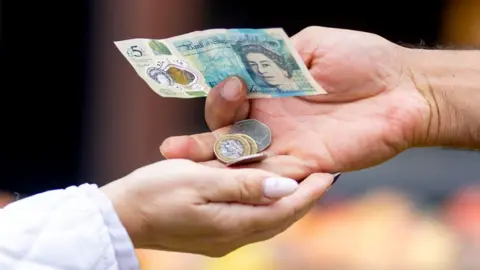One in five shop purchases now made in cash
 Getty Images
Getty ImagesCash use in the shops rose for a second year in a row after a decade of falls, according to retailers.
Notes and coins were used in a fifth of transactions last year, the British Retail Consortium (BRC) said, as shoppers found cash helped them to budget better.
The amount spent per purchase also dropped slightly from £22.43 in 2022, to £22.03 last year, it said.
The findings were published after charities told a committee of MPs that numerous groups were excluded from essential services and community venues that had started to refuse cash.
They cited issues for women in abusive relationships, whose partners use a bank account as a form of control or to track their movements.
Deidre Cartwright, policy manager at charity Surviving Economic Abuse, said: "Oftentimes access to cash is their only means to actually accessing essentials for themselves and their children.
"It's a means for them to be able to escape an abuser, especially when that abuser can track them through a bank account, so it's incredibly important for their safety and survival."
Some older people and those with mental health issues were also far more comfortable using cash, the Treasury Committee heard, or did not have the digital skills or mental capability to operate only with cards, computers or phones.
Leisure centres to universities go cash-free
Charities said that exclusion was seen across a wide range of services and venues.
Wayne Crocker, director at Mencap Cymru, said people might have a choice of going to an alternative cafe if another in town decided to stop accepting cash.
However, were a town's only theatre - or one based in a university - to go cash-free, then some more vulnerable people would no longer be able to visit.
Ron Delnevo, from the Payment Choice Alliance, said leisure centres, parking services, and catering on public transport were among the many services that may no longer accept cash.
"We have some heart-rending stories from families of people with disabilities, who feel that when they don't have cash accepted, it is robbing them of their self-esteem," he said.
"This was their money and they had the right to spend it, and they are being told their money is no good anymore. They take that as implying that they're no good anymore."
The BRC said all large retailers were committed to accepting cash in their stores.
Figures published in July from banking trade body UK Finance showed the majority of young people paid for things using smartphones or watches.
Nearly three-quarters (72%) of 18 to 24-year-olds regularly used their digital wallets to make contactless payments.
But it also found the number of people who mainly used cash for day-to-day spending hit a four year high owing to the cost of living.
That was backed up by the BRC's latest data.
“Persistent inflation and the cost of living crisis continued to affect households across the country and many consumers used cash to budget more effectively," said Chris Owen, payments policy adviser the BRC.
The trade body wants regulators to take meaningful action on fees charged by card companies.
Small businesses have also called for banks to keep branches open, or provide adequate facilities to allow them to deposit cash.
Banking data shows cash remains the second most popular payment method, after debit cards.
Stricter rules on ensuring banks and building societies offer access to cash have been announced by the City watchdog, the Financial Conduct Authority (FCA).
It said its new rules would require banks and building societies, when considering branch closures, to fill gaps in cash access with measures such as banking hubs, ATMs and Post Office facilities.
